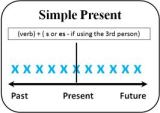Adverbs of frequency tell us how often something happens, and they can be either definite or indefinite. Because we are talking about repeated or habitual activities, adverbs of frequency are usually only used with the Present Simple tense.
Some examples of definite adverbs of frequency:
- Hourly, daily, weekly, monthly, yearly.
- Every minute, once an hour, quarterly.
- Once, twice, three times, a million times.
Definite adverbs of frequency usually go at the end of the sentence, like most definite time expressions.
- Most businesses submit their taxes quarterly.
- He checks his watch every minute.
- The bell rings every hour.
We can also put the adverb at the beginning of the sentence for strong emphasis:
- Every night, we stay up late to study.
- Twice a year, she goes to Chile.
- Every year, thousands of people are misdiagnosed.
.
Some examples of indefinite adverbs of frequency, and a general idea of how often the action takes place:
- 100% always, constantly, continuously, habitually
- 90% usually, normally, mostly, regularly
- 75% frequently, generally, repeatedly
- 60% often
- 50% sometimes
- 40% occasionally, sporadically
- 20% rarely, seldom, infrequently
- 0% never
Adverbs of indefinite frequency usually go in the middle of the sentence before the main verb, except the verb “to be“.
- We always walk to school.
- She usually drinks coffee in the morning.
- They generally study at the library.
- I am often on time.
- She sometimes plays chess.
- He occasionally skips school.
- They are seldom wrong.
.
If there is an auxiliary verb and a main verb, the adverb goes between them:
- I can usually remember.
- He doesn’t often cry.
Except with “have to”, the adverb goes before the auxiliary:
- We usually have to wake up early.
- He always has to drive his kids to school.
.
Sometimes, for emphasis, we can put the adverb at the beginning of the sentence. (see what I did there?)
- Usually we eat dinner at 6:00.
- Occasionally I walk around the seawall.
Or at the end:
- We do that too, usually.
- They go to church regularly.
.
“Sometimes” can go at the beginning, middle, or end:
✔ Sometimes they eat healthy.
✔ They sometimes eat healthy.
✔ They eat healthy sometimes.
.
“Always” can NOT go at the beginning or the end of the sentence, only in the middle:
✔ She always works hard.
✘ Always she works hard.
✘ She works hard always.
.
For questions and negative statements, the adverb goes before the main verb, except the verb “to be“.
- Why do they always complain?
- Who is she constantly talking to on the phone?
- They aren’t usually nice.
- I don’t often eat fast food.
- I‘m not normally this irritable.
Negative adverbs like “never”, “seldom”, and “rarely” do not go at the end of the sentences. They can go at the beginning of the sentence to add a strong emphasis, but then the rest of the sentence must take a question form, even though it is a statement.
- Never have I seen such a beautiful woman!!
- Seldom does he work so late.
- Rarely do I get straight A’s.
.
Negative adverbs, such as seldom, rarely, and never aren’t usually used in the negative or question form.
✘ I don’t seldom get to school on time.
✔ I seldom get to school on time.
✔ I don’t usually get to school on time.
✘ Do you rarely eat sushi?
✔ Do you often eat sushi?
.
Occasionally, we use adverbs of frequency with the Present Progressive to complain about something:
- He is always smoking.
- They are constantly playing loud music.
- She is forever talking on the phone.

